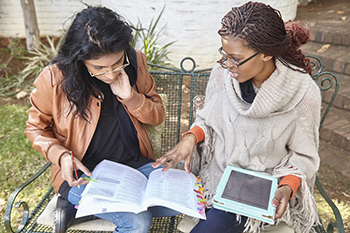News & Events
Working towards mother tongue-based multilingual education
The Unisa Language Unit is a strategic project that monitors the implementation of language policy at Unisa on behalf of the Senate Language Committee. Its functions include promoting the use of African languages and South African Sign Language within the university, implementing multilingualism and establishing good language management practices at Unisa.

Unisa recognises the educational value and benefits of teaching and learning in each student’s own language
The Language Unit is housed at the Department of Tuition Support and Facilitation of Learning. Professor Koliswa Moropa, Project Leader: Language Unit, explains that the unit’s staffing structure entails five staff members: a project leader, three language specialists and one administrative officer. Asked what the unit’s day-to-day activities are, Moropa explains: “Currently, the main task is to coordinate the revision of the 2016 Unisa Language Policy in line with the Language Policy Framework for Public Higher Education Institutions (2020) that came into effect in 2022.” She adds: “The policy framework states that, since the propagation of the Language Policy for Higher Education, little progress has been made in exploring and exploiting the potential role of indigenous African languages in facilitating access and success as well as the intellectualisation of these languages in higher education.”
Moropa also explains that another one of the unit’s critical functions is to monitor the learning of an additional language for student support in all South African languages. Unisa provides facilities through the relevant departments and encourages employees to learn an African language and South African Sign Language, and to increase their competence in any medium of instruction.
The importance of the unit in a university context
Asked how these functions and the department are a critical part of a university environment, Moropa explains: “In 2016, Unisa, in line with its vision, amended its language policy to give effect to its transformation agenda. The implementation plan of the 2016 Unisa Language Policy was adopted in 2017. To achieve its goal, the university introduced a Language Unit as a strategic project within the Department of Tuition Support and Facilitation of Learning.” In addition, through the unit, Unisa acknowledges that there are 11 official languages in South Africa and ensures that, together with the Khoi, Nama and San languages, and South African Sign Language, they enjoy parity of esteem and equitable treatment. Unisa also recognises the educational value and benefits of teaching and learning in each student’s own language.
To meet its goals, the unit organises language webinars and workshops in collaboration with relevant stakeholders, and also partners with other higher education institutions to learn good practices and current trends in the promotion of multilingualism and language development, among other efforts. The unit is also responsible for several interesting programmes at Unisa, including terminology development and the Google Translate Initiative. Through its terminology development programme, Unisa colleges develop multilingual glossaries across disciplines for student support. The programme develops terminology lists of assessment terms (verbs/phrases) that are commonly used in assessment practices, i.e. assignments, examinations and any other forms of assessment. Moropa says: “Developing these term lists does not only assist students to understand the terms in their preferred languages during the assessment, but also promotes the standardisation of terminologies. A terminology list of assessment terms in 11 official languages of South Africa for use by students and academic staff across colleges at Unisa was completed by the Language Unit in 2020.”
Its Google Translate initiative is overseen in collaboration with the Department of Institutional Advancement. The initiative implemented Google translate on eConnect in two languages, isiZulu and Sesotho, with English as the source language. The project started in 2019 and the unit plans to add two more languages, isiXhosa and Afrikaans. Moropa concludes: “The Unisa Language Policy (2016:1) states that mother tongue-based multilingual education to support all South African students studying at the university is an ideal that must be the ultimate goal even if the time span to achieve that goal may only be for future generations. To achieve success in students’ support activities, collaborative efforts and partnerships should be strengthened.”
*To make use of the Language Unit services, send email to sethoa@unisa.ac.za
*By Tshimangadzo Mphaphuli, Senior Journalist, Department of Institutional Advancement
Publish date: 2022-05-23 00:00:00.0
